The global automotive hoses and assemblies market is projected to reach USD 43.0 billion by 2035, reflecting an absolute increase of USD 17.3 billion over the forecast period. The market is valued at USD 25.7 billion in 2025 and is expected to grow at a CAGR of 5.3%. This growth is driven by increasing demand for automotive parts that enhance performance, safety, and reliability in modern vehicles, along with the trend toward vehicle electrification and the need for more efficient cooling, heating, and fluid-transfer systems. Automotive hoses and assemblies are critical components used for fluid management, exhaust systems, and air conditioning in vehicles, playing a key role in maintaining smooth and efficient vehicle operation.
Automotive hoses and assemblies are used in various applications, such as air intake, cooling, braking, fuel, and exhaust systems. They are designed to withstand high pressure, heat, and chemical exposure, ensuring that vehicle systems function optimally over time. As vehicles become more advanced, especially with the rise of electric vehicles (EVs) and hybrid vehicles, there is an increasing need for specialized hoses and assemblies to manage the more complex fluid systems used for cooling, battery management, and air circulation. The growth in the automotive industry, particularly in the EV sector, is expected to further drive the demand for advanced hoses and assemblies.
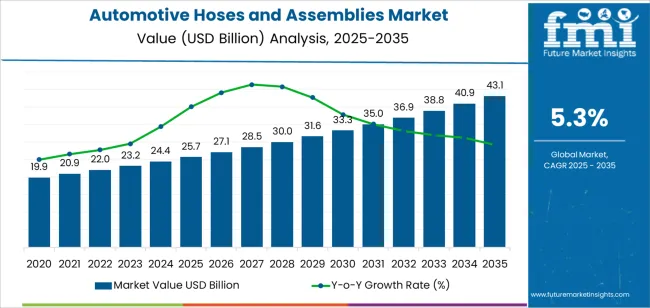
Technological advancements in hose materials, such as the use of high-strength rubber, plastics, and composite materials, are improving the durability and performance of these components. As automotive manufacturers continue to focus on reducing vehicle weight, improving fuel efficiency, and meeting stringent environmental regulations, the demand for high-performance automotive hoses and assemblies is expected to increase over the next decade.
Between 2025 and 2030, the automotive hoses and assemblies market is projected to grow from USD 25.7 billion to approximately USD 32.2 billion, adding USD 6.5 billion, which accounts for about 37.7% of the total forecasted growth for the decade. This growth will be driven by the increasing demand for advanced hoses in electric and hybrid vehicles, as well as innovations in automotive fluid management systems. As vehicles become more complex with the rise of electrification, specialized hoses for cooling, battery management, and fluid transfer are becoming essential components.
From 2030 to 2035, the market is expected to expand further from approximately USD 32.2 billion to USD 43.0 billion, adding USD 10.8 billion, which constitutes about 62.3% of the overall growth. This phase will see continued adoption of electric vehicles, which require more advanced fluid systems due to their complex powertrains and batteries. Advancements in fuel efficiency technologies and stricter environmental regulations will drive the demand for more specialized hoses and assemblies designed to improve vehicle performance and reduce emissions.
The growing trend of lightweight and high-performance materials in automotive manufacturing will also contribute to the market's expansion, as manufacturers seek to improve vehicle fuel efficiency and overall durability. The continued evolution of electric and hybrid vehicles, alongside innovations in fluid and thermal management systems, will fuel the automotive hoses and assemblies market’s growth through 2035.
| Metric | Value |
|---|---|
| Market Value (2025) | USD 25.7 billion |
| Market Forecast Value (2035) | USD 43.0 billion |
| Forecast CAGR (2025-2035) | 5.3% |
The automotive hoses and assemblies market is growing due to the increasing demand for advanced automotive systems that require high-performance hoses and assemblies. These components are critical in managing fluid and air flow in various automotive applications, such as fuel systems, cooling systems, air conditioning, and brake systems. As the automotive industry continues to evolve, the need for durable, lightweight, and high-performance hoses and assemblies is becoming more pronounced, driving the growth of this market.
The rise in automotive production, particularly in emerging markets, is a key factor contributing to market growth. The demand for vehicles, especially passenger cars and light commercial vehicles, is increasing globally, and with it, the need for reliable and efficient hose and assembly solutions. The push for more fuel-efficient and environmentally friendly vehicles is further fueling demand for advanced hose systems that can withstand high temperatures, pressure, and chemical exposure while minimizing emissions.
Technological advancements in materials and manufacturing processes are improving the performance and durability of automotive hoses and assemblies. The growing adoption of electric vehicles (EVs) and hybrid vehicles, which require specialized cooling and fluid management systems, is also contributing to market growth. Challenges such as fluctuating raw material costs and stringent regulatory standards related to automotive parts may affect the growth of the market in the short term. Despite these challenges, the market is expected to continue expanding as the automotive industry focuses on improving vehicle efficiency and safety.
The market is segmented by type, application, and region. By type, the market is divided into cooling system hoses and assemblies, power steering system hoses and assemblies, brake system hoses and assemblies, fuel system hoses and assemblies, and others, with cooling system hoses and assemblies representing the largest segment. Based on application, the market is categorized into automotive OEM market and automotive aftermarket, with the automotive OEM market holding the largest share. Regionally, the market is divided into North America, Europe, Asia Pacific, and other key regions.
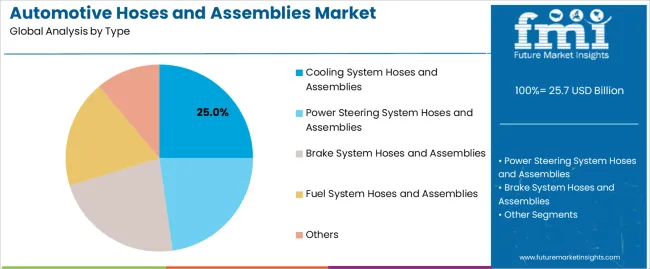
The cooling system hoses and assemblies segment leads the automotive hoses and assemblies market, accounting for 25% of the total market share. This segment's growth is primarily driven by the increasing demand for efficient and durable cooling solutions in modern vehicles. Cooling system hoses and assemblies are crucial for maintaining optimal engine temperature and preventing overheating, making them essential components in automotive systems. With the growing complexity of engine designs, including the rise of turbocharged engines and the integration of electric vehicles (EVs), the demand for high-performance hoses and assemblies has increased significantly.
The ongoing push for improved fuel efficiency and reduced vehicle emissions has resulted in the adoption of advanced cooling technologies, which require more durable and specialized hoses. As automotive manufacturers continue to innovate and improve vehicle performance, the need for reliable cooling system hoses and assemblies will continue to drive growth in this segment. The rising number of vehicles on the road, coupled with the increasing focus on engine efficiency and temperature management, ensures that the cooling system hoses and assemblies segment remains a market leader.
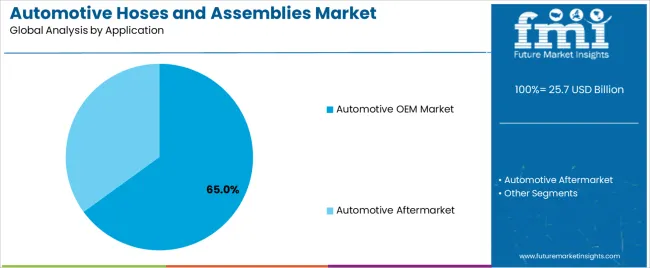
The automotive OEM market dominates the automotive hoses and assemblies market, holding 65% of the total market share. This dominance is driven by the increasing demand for original equipment manufacturer (OEM) components used in the production of new vehicles. OEM parts are crucial in ensuring the reliability, safety, and performance of vehicles, and automotive manufacturers prefer these parts because they are specifically designed and tested for the particular make and model. As global vehicle production continues to grow, the need for high-quality hoses and assemblies from OEM suppliers is expected to remain strong.
The trend toward vehicle electrification, the development of advanced powertrains, and the increasing demand for autonomous driving technologies all contribute to the need for more specialized and efficient hoses and assemblies. The automotive OEM market also benefits from growing vehicle production in emerging markets, where demand for both mass-market and premium vehicles is on the rise. As manufacturers prioritize quality and innovation in new vehicle designs, the automotive OEM market segment is poised to maintain its leadership in the automotive hoses and assemblies market.
The automotive hoses and assemblies market is growing due to increased vehicle production and the need for advanced hose systems in modern powertrains. Key drivers include the rise in electric and hybrid vehicles, stricter emission standards, and growth in aftermarket sales. These hoses offer benefits like lightweight materials and thermal resistance. Restraints include raw material price volatility, intense competition, and challenges in adapting to new materials and designs for EVs.
Automotive hoses and assemblies are gaining popularity because they are critical to modern vehicle fluid and thermal‑management systems, including cooling, fuel, air‑conditioning, and EV battery systems. As manufacturers shift to electric and hybrid platforms, they require hoses with higher temperature ratings, chemical resistance, and durability. The aftermarket segment is growing as vehicles stay on the road longer and demand for replacement parts rises. With advanced manufacturing enabling hose assemblies that reduce weight and simplify fitment, these components become integral to vehicle architecture and performance enhancements.
Material and design innovations are driving growth in the automotive hoses and assemblies market through the adoption of high‑performance elastomers, multilayer composites, lightweight thermoplastics, and quick‑connect assemblies. These innovations improve durability, reduce weight, and enhance installation efficiency. For electric vehicles, specialized thermal‑management hoses are emerging to manage battery and inverter cooling needs. Modular assemblies reduce assembly time on the production line and support tighter packaging in modern vehicle layouts. These advances create opportunities for suppliers to offer differentiated products and align with OEM goals for efficiency and performance.
Despite strong demand, the market faces several key challenges. One major barrier is raw‑material cost volatility, particularly for specialized elastomers and composites, which pressures margins and complicates forecasting. Another is the transition to EV thermal and fluid architectures, which requires redesigning hoses and assemblies and may lead to obsolescence of legacy components. Intense competition and price sensitivity in both OEM and aftermarket segments limit profitability. Regulatory and qualification hurdles including material flammability, chemical compatibility, and long‑term durability testing extend development cycles and raise upfront costs for suppliers moving into next‑generation products.
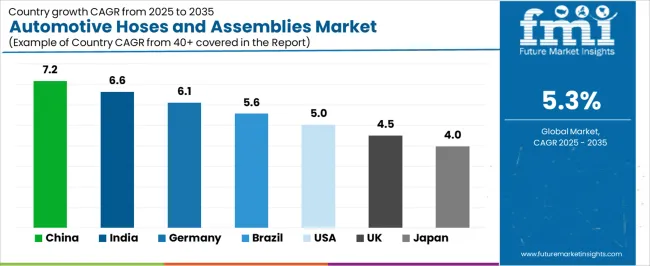
| Country | CAGR (%) |
|---|---|
| China | 7.2% |
| India | 6.6% |
| Germany | 6.1% |
| Brazil | 5.6% |
| USA | 5.0% |
| UK | 4.5% |
| Japan | 4.0% |
The automotive hoses and assemblies market is experiencing steady growth globally, with China leading at a 7.2% CAGR, driven by the country’s booming automotive industry and increasing demand for high-performance components. India follows at a 6.6% CAGR, fueled by the country’s rapidly expanding automotive production and increasing vehicle sales. Germany shows a 6.1% CAGR, supported by its advanced automotive manufacturing sector and strong demand for precision-engineered hoses and assemblies.
Brazil experiences a 5.6% CAGR, driven by growth in the automotive sector and increasing demand for durable and high-quality parts. The USA grows at 5.0%, supported by high automotive production and replacement demand. The UK shows a 4.5% CAGR, driven by the country’s automotive aftermarket and increasing vehicle production. Japan grows at a 4.0% CAGR, influenced by its strong automotive industry and demand for high-quality automotive components.
China is leading the automotive hoses and assemblies market with a 7.2% CAGR, driven by its position as the world’s largest automobile producer and consumer. The demand for automotive hoses, which are essential for fluid and gas transfer in vehicles, is increasing as China continues to ramp up its automotive manufacturing and production. Both domestic vehicle production and exports require high-performance hoses and assemblies to meet safety, environmental, and quality standards. The automotive industry’s rapid expansion in electric vehicles (EVs) further contributes to this demand, as EVs also require specialized hoses for cooling systems, fuel lines, and other components.
China’s growing middle class and increasing vehicle sales, coupled with investments in new manufacturing facilities, are fueling the demand for automotive components. The government’s initiatives to boost domestic automotive production, including support for electric vehicles and advanced automotive technologies, play a vital role in increasing the need for automotive hoses and assemblies. China’s aftermarket industry is expanding, driving the replacement demand for high-quality hoses. As the country’s automotive sector continues to evolve with green technologies and increased vehicle production, the demand for automotive hoses and assemblies is expected to rise, further solidifying China’s position in the global market.
India is experiencing strong growth in the automotive hoses and assemblies market with a 6.6% CAGR, fueled by the country's rapidly expanding automotive sector. The increasing demand for both domestic vehicle production and exports, along with rising consumer disposable income and vehicle ownership, is driving the need for high-performance hoses. India’s automotive industry is shifting towards more advanced vehicles, including electric and hybrid vehicles, which further increases the demand for specialized hoses for fluid management, cooling systems, and other components.
India’s burgeoning automotive aftermarket sector is also contributing to market growth. As vehicle ownership rises, the demand for replacement parts, including automotive hoses and assemblies, continues to increase. The government’s push for manufacturing through initiatives like "Make in India" is stimulating production and supply chain improvements, which in turn are driving the need for reliable and cost-effective hoses in the automotive industry. As India’s automotive manufacturing capabilities continue to grow and evolve, the market for automotive hoses and assemblies will expand further, supported by growing production, rising vehicle sales, and an increasing focus on electric vehicle technology.
Germany is contributing significantly to the automotive hoses and assemblies market with a 6.1% CAGR, driven by its position as a global leader in automotive manufacturing and technology. Germany's automotive industry, home to renowned manufacturers such as Volkswagen, BMW, and Mercedes-Benz, places a strong emphasis on innovation, quality, and precision in its vehicles, which requires high-performance automotive hoses and assemblies. These components are vital for ensuring vehicle efficiency, safety, and durability, especially in premium vehicles and high-performance models that require advanced fluid and gas transfer systems.
The demand for automotive hoses in Germany is also being driven by the growing adoption of electric vehicles (EVs) and hybrid models, as these vehicles require specialized hoses for cooling and fluid management systems. Germany’s focus on sustainability and the transition to green automotive technologies also supports this demand. The country’s strong automotive aftermarket sector, driven by a large base of vehicle owners, further boosts the market for replacement parts like hoses and assemblies. With continued growth in automotive production and advancements in technology, Germany will remain a key player in the automotive hoses and assemblies market.
Brazil is experiencing steady growth in the automotive hoses and assemblies market with a 5.6% CAGR, driven by the expanding automotive sector and increasing demand for vehicle production and parts. Brazil’s automotive industry is one of the largest in Latin America, with a growing base of domestic manufacturers and an increasing number of international automakers establishing production facilities in the country. The need for automotive hoses, particularly for fluid and gas transfer in internal combustion engine vehicles and electric vehicles (EVs), is rising in line with this growth.
Brazil’s automotive aftermarket is also contributing to the growth of the market, as more vehicles on the road lead to increased demand for replacement hoses and assemblies. As the country’s automotive sector continues to grow, with a focus on both traditional vehicle production and the development of electric vehicles, the demand for high-quality automotive hoses and assemblies will continue to rise. Brazil’s infrastructure development and rising consumer incomes are further pushing the demand for reliable, efficient, and cost-effective components, ensuring sustained growth in the automotive hoses and assemblies market.
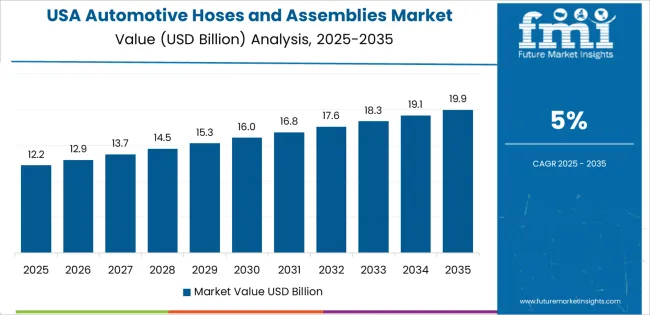
The USA is witnessing steady growth in the automotive hoses and assemblies market with a 5.0% CAGR, driven by the country’s mature automotive sector and high vehicle production volumes. The USA is one of the largest producers of automobiles in the world, with a strong focus on both internal combustion engine (ICE) vehicles and the growing electric vehicle (EV) segment. The increasing adoption of EVs in the USA is driving demand for specialized hoses for cooling systems, fluid management, and battery systems. The country’s growing automotive aftermarket is contributing to the market as consumers increasingly replace hoses and assemblies in aging vehicles.
The USA automotive sector is also characterized by continuous advancements in technology, with a growing emphasis on fuel efficiency, safety, and performance. This drives the need for high-quality hoses and assemblies that can meet the requirements of modern vehicles. The trend towards fuel-efficient and environmentally friendly vehicles, including hybrids and electric vehicles, further supports the demand for advanced hoses and assemblies in the market. As vehicle production continues to rise and new technologies emerge, the demand for automotive hoses and assemblies in the USA will continue to grow steadily.
The UK is witnessing moderate growth in the automotive hoses and assemblies market with a 4.5% CAGR, driven by the country’s well-established automotive manufacturing industry and strong focus on innovation. The UK automotive market is shifting towards more sustainable vehicles, including hybrids and electric vehicles (EVs), which require specialized hoses for cooling and fluid management systems. The increasing demand for high-performance vehicles and the push for better fuel efficiency is driving the need for advanced automotive hoses and assemblies.
The growing trend of replacing parts in older vehicles, supported by a strong automotive aftermarket in the UK, is also contributing to the growth of the market. With the UK’s ongoing commitment to reducing carbon emissions and adopting green technologies, the demand for environmentally friendly components, such as high-efficiency hoses and assemblies, is expected to rise. As the country transitions to cleaner, more energy-efficient transportation, the need for automotive hoses and assemblies that support these technologies will continue to grow, ensuring steady expansion in the market.
Japan is experiencing steady growth in the automotive hoses and assemblies market with a 4.0% CAGR, driven by the country’s strong automotive industry and technological advancements. Japan is home to some of the world’s leading automotive manufacturers, including Toyota, Honda, and Nissan, which require high-quality hoses and assemblies for their vehicles. The growing demand for electric vehicles (EVs) and hybrid models in Japan is also contributing to the increased need for specialized hoses that manage cooling, fluid transfer, and battery systems.
The Japanese market is characterized by a high level of technological sophistication, with manufacturers increasingly focusing on high-performance materials and components that enhance vehicle efficiency and longevity. While the growth rate is slower compared to emerging markets, Japan’s well-established automotive sector and commitment to innovation in vehicle production ensure a steady demand for automotive hoses and assemblies. As the country continues to develop more fuel-efficient and environmentally friendly vehicles, the market for automotive hoses and assemblies in Japan is expected to maintain steady growth.
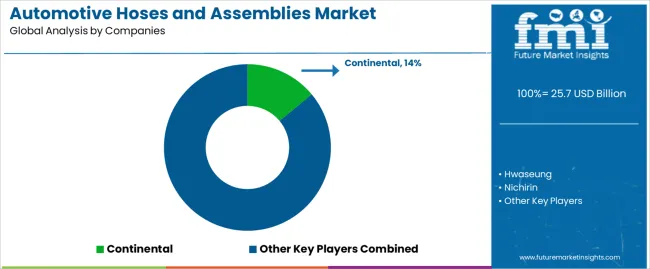
The automotive hoses and assemblies market is diverse and competitive, with major players offering a wide range of products used in critical automotive systems like fuel, cooling, and hydraulic systems. Continental leads the market with a 14% share, known for its high-quality hoses and assemblies that cater to a wide variety of automotive applications. Continental’s strong presence in both the original equipment (OE) and aftermarket segments, combined with its innovation in material technology, gives it a leading edge in the market.
Other significant players include Hwaseung, Nichirin, and Flexitech, each recognized for their expertise in manufacturing durable and performance-oriented automotive hoses. Hwaseung specializes in automotive parts and hoses, particularly for the automotive and industrial sectors. Nichirin is known for producing high-performance hoses that are widely used in various automotive systems, while Flexitech focuses on designing flexible hoses for high-performance applications, often tailored for racing and performance vehicles.
Companies such as JEGS, Vibrant Performance, and Summit Racing cater to the aftermarket segment, offering specialized hoses and assemblies that meet the demands of automotive enthusiasts and custom vehicle builders. PPE, Turbosmart, and Dayco also play significant roles in the market, offering a range of products for performance, fuel, cooling, and exhaust systems.
Additional players such as Cut and Couple, Grainger, Abbott Rubber, and Codan Rubber contribute to the market by providing cost-effective, high-quality hose solutions for various automotive applications. Manuli, Parker Hannifin, and Gates Corporation are major global suppliers offering innovative hose and assembly solutions across a range of vehicle types, from passenger cars to heavy-duty trucks.
Regional players like Toyoda Gosei, Tianjin Pengling Group, and Zhejiang Junhe Technology strengthen the market by offering competitive products in specific geographic areas. Other manufacturers such as Chuanhuan Technology, Qingdao Sunsong, and Ningbo TIP Rubber Technology further diversify the market with high-performance hoses used in a range of automotive systems, including brake lines, fuel lines, and air conditioning systems.
| Items | Values |
|---|---|
| Quantitative Units (2025) | USD billion |
| Type | Cooling System Hoses and Assemblies, Power Steering System Hoses and Assemblies, Brake System Hoses and Assemblies, Fuel System Hoses and Assemblies, Others |
| Application | Automotive OEM Market, Automotive Aftermarket |
| Regions Covered | Asia Pacific, Europe, North America, Latin America, Middle East & Africa |
| Countries Covered | China, Japan, South Korea, India, Australia & New Zealand, ASEAN, Rest of Asia Pacific, Germany, United Kingdom, France, Italy, Spain, Nordic, BENELUX, Rest of Europe, United States, Canada, Mexico, Brazil, Chile, Rest of Latin America, Kingdom of Saudi Arabia, Other GCC Countries, Turkey, South Africa, Other African Union, Rest of Middle East & Africa |
| Key Companies Profiled | Continental, Hwaseung, Nichirin, Flexitech, JEGS, Vibrant Performance, Summit Racing, PPE, Turbosmart, Dayco, Cut and Couple, Grainger, Abbott Rubber, Codan Rubber, Manuli, Parker Hannifin, Gates Corporation, Toyoda Gosei, Tianjin Pengling Group, Zhejiang Junhe Technology, Chuanhuan Technology, Qingdao Sunsong, Luohe Letone Hydraulics Technology, Ningbo TIP Rubber Technology, Meichen Technology, Shanghai Shangxiang Automotive Hose, Ningbo Fengmao Far East Rubber |
| Additional Attributes | Dollar sales by type and application categories, market growth trends, market adoption by classification and application segments, regional adoption trends, competitive landscape, technological advancements in automotive hoses and assemblies, integration with automotive manufacturing and aftermarket systems. |
The global automotive hoses and assemblies market is estimated to be valued at USD 25.7 billion in 2025.
The market size for the automotive hoses and assemblies market is projected to reach USD 43.1 billion by 2035.
The automotive hoses and assemblies market is expected to grow at a 5.3% CAGR between 2025 and 2035.
The key product types in automotive hoses and assemblies market are cooling system hoses and assemblies, power steering system hoses and assemblies, brake system hoses and assemblies, fuel system hoses and assemblies and others.
In terms of application, automotive oem market segment to command 65.0% share in the automotive hoses and assemblies market in 2025.






Our Research Products

The "Full Research Suite" delivers actionable market intel, deep dives on markets or technologies, so clients act faster, cut risk, and unlock growth.

The Leaderboard benchmarks and ranks top vendors, classifying them as Established Leaders, Leading Challengers, or Disruptors & Challengers.

Locates where complements amplify value and substitutes erode it, forecasting net impact by horizon

We deliver granular, decision-grade intel: market sizing, 5-year forecasts, pricing, adoption, usage, revenue, and operational KPIs—plus competitor tracking, regulation, and value chains—across 60 countries broadly.

Spot the shifts before they hit your P&L. We track inflection points, adoption curves, pricing moves, and ecosystem plays to show where demand is heading, why it is changing, and what to do next across high-growth markets and disruptive tech

Real-time reads of user behavior. We track shifting priorities, perceptions of today’s and next-gen services, and provider experience, then pace how fast tech moves from trial to adoption, blending buyer, consumer, and channel inputs with social signals (#WhySwitch, #UX).

Partner with our analyst team to build a custom report designed around your business priorities. From analysing market trends to assessing competitors or crafting bespoke datasets, we tailor insights to your needs.
Supplier Intelligence
Discovery & Profiling
Capacity & Footprint
Performance & Risk
Compliance & Governance
Commercial Readiness
Who Supplies Whom
Scorecards & Shortlists
Playbooks & Docs
Category Intelligence
Definition & Scope
Demand & Use Cases
Cost Drivers
Market Structure
Supply Chain Map
Trade & Policy
Operating Norms
Deliverables
Buyer Intelligence
Account Basics
Spend & Scope
Procurement Model
Vendor Requirements
Terms & Policies
Entry Strategy
Pain Points & Triggers
Outputs
Pricing Analysis
Benchmarks
Trends
Should-Cost
Indexation
Landed Cost
Commercial Terms
Deliverables
Brand Analysis
Positioning & Value Prop
Share & Presence
Customer Evidence
Go-to-Market
Digital & Reputation
Compliance & Trust
KPIs & Gaps
Outputs
Full Research Suite comprises of:
Market outlook & trends analysis
Interviews & case studies
Strategic recommendations
Vendor profiles & capabilities analysis
5-year forecasts
8 regions and 60+ country-level data splits
Market segment data splits
12 months of continuous data updates
DELIVERED AS:
PDF EXCEL ONLINE
Automotive Brake Hoses and Assemblies Market Size and Share Forecast Outlook 2025 to 2035
Automotive Power Steering Hoses and Assemblies Market Size and Share Forecast Outlook 2025 to 2035
Demand for Automotive Hoses and Assemblies for OEM in USA Size and Share Forecast Outlook 2025 to 2035
Automotive Direct Liquid Cooling IGBT Module Market Size and Share Forecast Outlook 2025 to 2035
Automotive Network Testing Market Size and Share Forecast Outlook 2025 to 2035
Automotive Performance Part Market Size and Share Forecast Outlook 2025 to 2035
Automotive Carbon Ceramic Brake Market Size and Share Forecast Outlook 2025 to 2035
Automotive Camshaft Market Size and Share Forecast Outlook 2025 to 2035
Automotive Stamping Industry Analysis in India Size and Share Forecast Outlook 2025 to 2035
Automotive Cylinder Liner Market Size and Share Forecast Outlook 2025 to 2035
Automotive Microcontroller Market Size and Share Forecast Outlook 2025 to 2035
Automotive Roof Rails Market Size and Share Forecast Outlook 2025 to 2035
Automotive Active Safety System Market Size and Share Forecast Outlook 2025 to 2035
Automotive Diagnostic Scan Tool Market Size and Share Forecast Outlook 2025 to 2035
Automotive Test Equipment Market Size and Share Forecast Outlook 2025 to 2035
Automotive Dynamic Map Data Market Size and Share Forecast Outlook 2025 to 2035
Automotive Green Tires Market Size and Share Forecast Outlook 2025 to 2035
Automotive E-Tailing Market Size and Share Forecast Outlook 2025 to 2035
Automotive Interior Market Forecast Outlook 2025 to 2035
Automotive Key Market Size and Share Forecast Outlook 2025 to 2035

Thank you!
You will receive an email from our Business Development Manager. Please be sure to check your SPAM/JUNK folder too.
Chat With
MaRIA